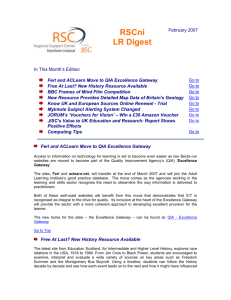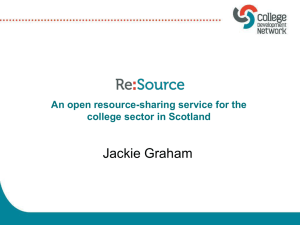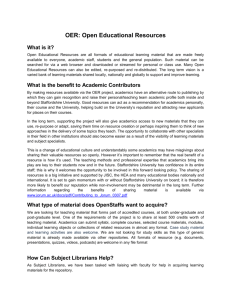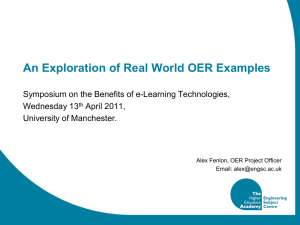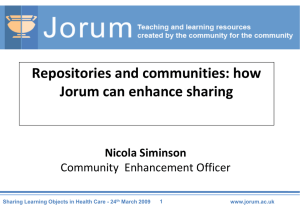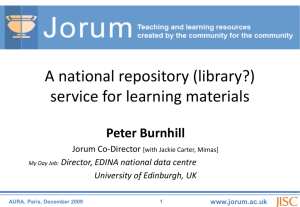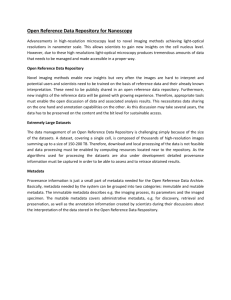Establishing a learning and teaching materials repository service for UK F/HEIs
advertisement
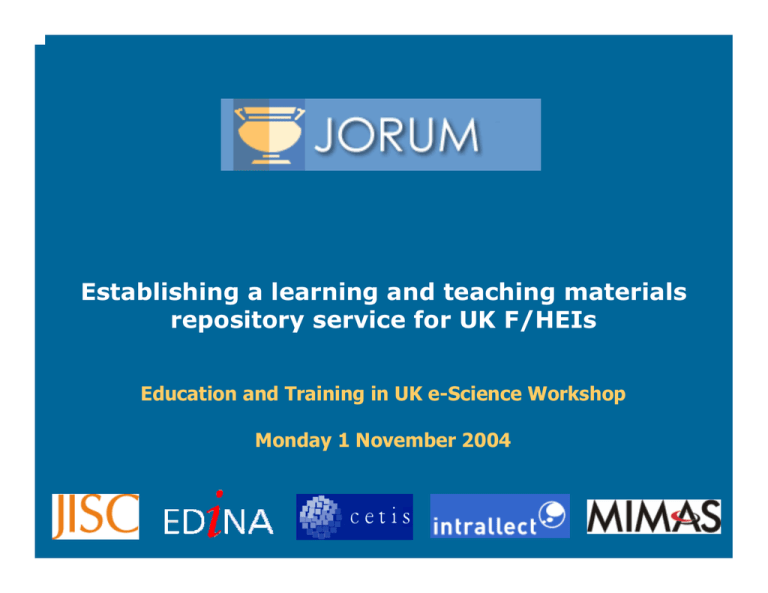
Establishing a learning and teaching materials repository service for UK F/HEIs Education and Training in UK e-Science Workshop Monday 1 November 2004 Presenter • Moira Massey JORUM Project Manager EDINA Learning and Teaching Co-ordinator – Moira.Massey@ed.ac.uk • Based at EDINA’s office in Merseyside, at St Helens FE College • Tel: 01744 623816 What does JORUM mean? • JISC Online Repository for [Learning and Teaching] Materials – NOUN: Large bowl containing drink; its contents (http://www.tiscali.co.uk/reference/dictionaries/difficultwords/d ata/d0007233.html) • Research project started October 2002, part of JISC’s Exchange for Learning (X4L) Programme • Now setting up service to all UK F/HEIs from August 2005 JORUM projects • Partners: EDINA and MIMAS • Advisors: Centre for Educational Technology Interoperability Standards (CETIS) – http://www.cetis.ac.uk • Undertook requirements exercise 2003 and reported January 2004 • Completed procurement exercise under European Union rules in July 2004 • Selected intraLibrary from Intrallect Ltd – http://www.intrallect.com What does a L&T repository do? • Hosts any digital resource that can be used to support education, teaching and learning • Provides “virtual objects” that reference materials (on and offline) held elsewhere • Offers the same facilities as a library i.e. search, browse, locate, preview and borrow • Offers additional facilities e.g. upload and publish, myLibrary, annotation, workflow • Supports all file formats for L&T and delivers content packages that can be played in a VLE, or resources for use by tutors Images from EDINA website home page are copyright Getty Images Inc, © 1998, 1999, 2000, 2001, 2002 Why a Repository? • Provides long-term retention for publicly funded project outputs • Will take learning/educational/training materials and staff development/teaching support materials • Supports staff involved in learning and teaching in their work, provided they are willing to share content with colleagues across the UK • Promotes the sharing, re-use and re-purposing of content • Likely to form part of a “landscape” of distributed repositories, sharing information about content via exposure of OAI metadata to portals • Stands as a national statement of the importance of creating interoperable, sustainable materials Browse intraLibrary Preview in intraLibrary Key Challenges • • • • • • Supporting interoperability Providing quality assurance Collation of materials Licensing Service model Fulfilling our duties as service providers Interoperability Interoperability “… the ability of two or more systems or components to exchange information and to use the information that has been exchanged..” Aims: • users not locked into proprietary systems • content transportable between different systems • production of conformant reusable and re-purposable materials • accessible to a range of tools and Learning Management Systems Standards and Specifications • • • • • • • • IEEE LOM (Learning Object Metadata) Standard Developed specifically to describe learning resources Mapped to Dublin Core Use of this standard, or sub-sets of it, mean that content can be shared between distributed systems Metadata can be “harvested” by portals to direct users to content Application Profiles of the IEEE LOM standard are sets of metadata elements for use in particular contexts Various JISC and other publicly funded bodies have worked together to produce Application Profiles for use in UK Further and Higher Education Others including IMS Content Packaging Specification What is JORUM doing? • JORUM Application Profile (next slide) to support export of materials and re-use in other systems • Exposing metadata via Open Archives Initiative (OAI) for harvesting by portals and other repositories • Developing functionality to harvest metadata from other repositories • Developing RSS functionality e.g. to provide alerts on new materials direct to portals and users, and from website JORUM Application Profile • Minimum common core of elements from the standard + associated vocabularies • JORUM will have an AP derived from: – the X4L – RDN/LTSN • JACS and Learndirect subject classifications • Subject specific schemes such as MeSH • UK Educational Levels • RDN/LTSN Learning Resource Type Vocabulary • LTSN Pedagogic Terms Vocabulary • LTSN Policy Themes Vocabulary – http://www.cetis.ac.uk/profiles/uklomcore – JORUM report at http://www.jorum.ac.uk Quality Assurance What is JORUM doing? • Quality Assurance of what? – Metadata? – Technical requirements? – Educational content? QA of Metadata • • • • Use of community-agreed Application Profile Awaiting report from CDLR at Strathclyde Workflow modelling Expert intermediaries for cataloguing QA of Technical Requirements • Workflow will include 2 stages for technical checks: – Automatic at repository at upload e.g. to check that content packages deposited have all the files they should have and comply with specifications – Final check at data centre before go-live (human check) QA of Educational Content • Workflow likely to include stage for institutions to add pedagogic check of their own materials (if wanted) • Not feasible for this to be undertaken at the data centres • Provision of annotation fields and star ratings • Consideration being given to support for more formal peer review processes Collation of Materials What materials will JORUM hold? • Simple materials – Excel spreadsheet with data for lab exercise – Word document with lesson plan, or schedule of work – Images – Powerpoint presentations • More complex materials – 3D Flash animations illustrating complex concepts e.g. chemical, geological etc – Learning objects, containing a number of files, some of which may provide student interactivity • Virtual objects – Files that contain a reference to materials not held in the repository From Where? • • • • • • • • • JISC-funded projects e.g. X4L Strand A, JISC DeL Programme HE Academy Generic Centre HE Academy Subject Centres Centres of Excellence in Teaching and Learning (CETLs) Open University staff development materials Digital Curation Centre National Centre for e-Social Sciences (NCeSS) – virtual objects ESRC Research Methods projects (possibly) Regional Support Centre Scotland North and East Image Engine programme • RSC Scotland South and West project proposals • Other consortia in England and Wales – under discussion currently – These are approaches that have made to us already – We have not yet started our formal promotional programme Legacy/Migration Issues • X4L content not always cleared for use in long-term service • Alteration in subject classification schemes between research project and long-term project • Project staff no longer in post • Content from JISC content services not always cleared for use in JORUM • Content from past programmes and other sources rarely developed in line with interoperability and content packaging specs • Licensing (next section) What about individual/institution deposit? • Facility for community deposit requested under JORUM Scoping Study • Many challenges (next section of talk refers) • Likely *not* to go live with this facility in August 2005 Licensing What are the issues? • Scoping Study found that community wants as many rights for re-use and re-purposing as possible • “More radical even than Australia”! – end user contracts • Supporting the permissions, and combinations of permissions, that IP rights owners are willing to give to end users – licences, schedules … • Ensuring that IP rights holders are listed, including third party rights holders • Who owns the IP rights anyway??? – Employment contracts are key More issues … • Who/which function represents the institution if the institution owns the IP rights (different in HE and FE) • Are institutions prepared to provide indemnification against third party claims? • What happens where HEFCE is potentially both Licensee and Licensor? • What would institutions think about having a “global” institutional deposit licence (for community deposit function)? • Technical implementation in system and workflow modelling • Technical issues with content packaging and what happens to content when “out there” – And our responsibilities as service providers • Provision of good online support and training materials What is JORUM doing? • Discussions with JISC and solicitor advising JISC – Next meeting 8 November • Deposit licences and end user contracts have been drawn up • Symbols have been prepared • Using rights expression language i.e. ODRL to store licence permissions • Working with Intrallect on technical implementation and workflow – but depends on some decisions yet to be made • Given issues with IP rights, employment contracts etc at institutions, too early to go live with community deposit function? • Likely to go live with collated materials from other project and publicly funded sources • Likely to investigate community deposit function, and work directly with institutions, as part of R&D work HTML mock-up showing “search results” and symbols Service Model Service Model • JORUM will be a service like other data centre services – 24/7 service delivery, data management, user support, training, helpdesk etc • Athens authenticated • No charge for first 3 years and further consideration thereafter (would be cost recovery only) • Always free at the point of use for staff • Institutions will be asked to subscribe to the service and create service teams locally, containing for example: – Site reps – Learning resource centre staff – Librarians – Learning technologists – ILT Champions – Local “experts” – Legal departments Our additional responsibilities as service providers of a repository • Provided by Charles Oppenheim: – – – – – – – – – – Breach of confidentiality and official secrets Personality and image rights Data protection Copyright Database rights Moral rights Defamation Obscenity/race hate material Contempt of court Trade marks and domain name disputes • JORUM needs a policy statement covering all of these areas Further Research Areas Further research areas • • • • • • • • • • Web services and fitting with JISC developments Watch on other repository developments How JORUM fits with local, regional etc repository developments Accessibility/Disability Discrimination Act Open Source repositories Long-term retention/preservation/lifecycle of materials Digital Rights Management (with JISC) Opening up to students Peer review systems Incentives for depositors To help you … • JORUM Scoping Study report (Jan 2004) available at: http://www.jorum.ac.uk/research/publications.html – Includes overview and recommendations, and separate reports on requirements work, metadata, DRM, accessibility and JISC Information Environment • Training and support materials, and best practice guides, will be made available at JORUM website next year • Review under way of internal reports for external publication • Contact Moira Massey at moira.massey@ed.ac.uk

